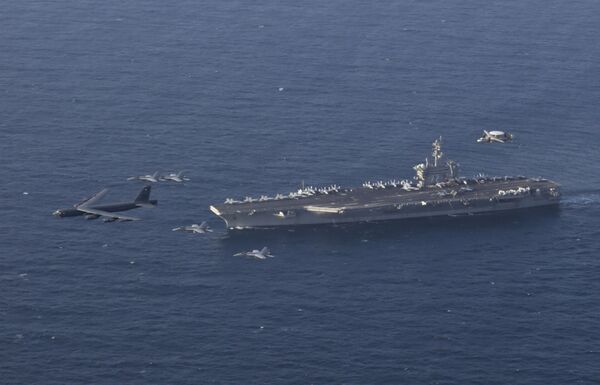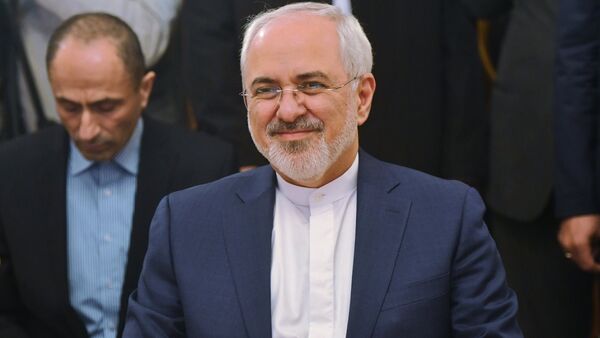The Trump administration has announced sanctions against Iranian Foreign Minister Mohammad Javad Zarif over his work for Supreme Leader Ayatollah Ali Khamenei who was subjected to hard-hitting US sanctions in late June.
"The US' reason for designating me is that I am Iran's 'primary spokesperson around the world'", Zarif tweeted in response to the US announcement. "Is the truth really that painful? It has no effect on me or my family, as I have no property or interests outside of Iran. Thank you for considering me such a huge threat to your agenda".
Tehran earlier warned the US that the imposition of sanctions on Supreme Leader Ayatollah Ali Khamenei and other top officials in the country would close the path to diplomacy between Iran and the US.
The Trump administration has previously called upon Tehran to hold "a conversation with no preconditions", while at the same time beefing up the US military presence in the Persian Gulf. For its part, Iran has refused to engage in talks with Washington referring to Donald Trump's unilateral withdrawal from the Joint Comprehensive Plan of Action (JCPOA) in May 2018.
Washington is 'Opening Up Paths to Confrontation' With Iran
Foad Izadi, professor of political communication at the University of Tehran, throws into question Washington's Iran strategy, referring to its obvious inconsistency.
"Sanctioning Iran's foreign minister on one hand and then talking about negotiating with Iran on the other hand do not match. It shows the level of hypocrisy. And it shows that the US is not really serious about negotiating with Iran", Izadi says.
The professor suspects that what the US is driving at is actually yet another regime change in the country: "This is a sign for a lot of people in Iran that the US is not really interested in negotiating, it's interested in Iran's surrender", he suggests.
According to the professor, "Iran won't appoint someone else besides Zarif" since "his capabilities are good, he's been in foreign service for more than three decades". But above all, Iran is not a US colony to follow Washington's orders, Izadi emphasises.
The professor believes that by sanctioning Iran's supreme leader and then the country's foreign minister the US is "actually hurting any possibility of reaching some sort of settlement with Iran which is quite dangerous because of recent escalations that we have seen in the Persian Gulf".
"They reduce the chances of finding a solution and increase the chances of war. I think that is what US is actually going to end up with and they block basically paths to talk to the other side by sanctioning the country's foreign minister, they are actually opening up paths to confrontation, including military confrontation", he warns.
The US has been strengthening its forces in the Middle Eastern region since May 2019 when it deployed B-52 Stratofortress bombers, a Patriot missile battery, the Abraham Lincoln Carrier Strike Group, and the Arlington amphibious transport dock to the area.
Following two incidents in the Gulf of Oman that were hastily blamed on Iran by the Trump administration, tensions escalated further with the downing of an American spy drone by Iran’s Islamic Revolutionary Guard Corps (IRGC) in late June.
US Air Force F-15E Strike Eagles fighter jets have even joined warfare exercises in the Persian Gulf, according to the Defense Visual Information Distribution Service (DVIDS).

US' Sanctions on Zarif are 'Sign of American Weakness'
Seyed Mohammad Marandi, a professor at Tehran University, who was part of the Iranian delegation that helped to negotiate the 2015 nuclear deal, echoes Izadi by saying that the Americans under Trump "were never serious about negotiations" with Tehran since their pull-out from the Iran nuclear deal.
"Personally I think that Americans during the last 40 years they've never really been honest in any of their dealings with Iran", he remarks.
According to Marandi, Washington's recent political manoeuvers amid the escalation of tensions in the region are "a sign of American weakness" and an indication that "their Empire is crumbling".
"The US, being a declining empire, is becoming less and less tolerant towards any voices of dissent, but I think this also in itself exposes more clearly the decline of the United States and its growing sense of insecurity", he says.
The imposition of sanctions on Zarif does not make it the situation easier for Washington: by silencing the Iranian foreign minister or attempting to silence him "they are only creating further tensions and pushing the whole region towards the dead end", the academic warns.
Marandi ruled out that Iran would ever renegotiate the current nuclear deal, signed by Tehran, the EU, and P5+1 in 2015.
"There will be no new nuclear agreement whether Dr Zarif is the foreign minister or not", the professor says. "And under no circumstances will Iran allow the Americans to choose and determine who Iran's foreign minister is. So, Dr Zarif will stay on as long as he feels that he is useful as the country's foreign minister regardless of what the Americans want and the nuclear deal is the only deal that's on the table".
Meanwhile, Iranian President Hassan Rouhani has dubbed Washington's decision to subject Zarif to sanctions "childish behaviour" and presumed that the US was apparently afraid of the Iranian foreign minister who recently gave a series of interviews to the American press.
"It is completely clear that the foundations of the White House have been shaken by the words and logic of an informed, devoted and diplomatic individual", he said in a televised statement on 1 August.
For its part, the European Union has expressed regret over the US move and signalled that they would continue to work with Zarif.
"We will continue to work with Mr Zarif as Iran's most senior diplomat and in view of the importance of maintaining diplomatic channels", said Carlos Martin Ruiz De Gordejuela, a spokesman for High Representative of the Union for Foreign Affairs Federica Mogherini.
The views expressed in this article are solely those of the speakers and do not necessarily reflect the official position of Sputnik.




